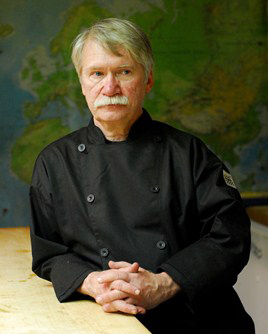Think Tank: Preparing Students to Be Humble, Caring and Generous
05 November 2014
 As much as our primary educational mission is to prepare students to be professionally successful in their chosen career, Chef Sorgule asserts our obligation extends far beyond: Educators have a responsibility to help mold good citizens, community leaders and honorable members of society.
As much as our primary educational mission is to prepare students to be professionally successful in their chosen career, Chef Sorgule asserts our obligation extends far beyond: Educators have a responsibility to help mold good citizens, community leaders and honorable members of society.
By Paul Sorgule, MS, AAC
Chefs and restaurateurs have historically been some of the most generous people that I have known; however, this generous nature grows by following the lead of mentors who set the example.
When disaster strikes, when others are in need, when a good cause cries out for support, chefs and restaurateurs are typically at the front of the line to help. This caring nature is what has always drawn me to restaurant people and something that I feel is paramount to truly experiencing a level of personal success.
As crusty as some chefs and restaurateurs appear to be, they care about others both on their team and in the community at large. Chefs, in particular, are very protective of their team, oftentimes going above the call of duty to support and help when there is a need.
When a young cook finds this environment of support it will always translate into a trait he or she will emulate moving through his or her career. Isn’t this an attribute that we (educators) should try to develop in our students? What are you doing to build a sense of caring and generosity among those in your program?
Think about the following examples:
- Build community service into your core curriculum
- Encourage your faculty to do the same and support their efforts
- Take on a cause as a program:
- Food drives for those who are hungry in your community
- Offer cooking classes through your community center to help those with limited income learn how to stretch their food dollar
- Plant a community garden and have your students maintain it
- Support your local elementary and secondary school-lunch programs by rotating culinary students and faculty as “Guest Chefs”
- Assist students in the design, production and service of community dinners to support nonprofit causes
- Open your food library to the community
- Sponsor a grocery-store “walk around,” guiding young families through the process of planning menus and selecting the right ingredients
- Volunteer to produce and deliver “meals on wheels” for those who are unable to leave their homes
- Assist farmers at local farmers’ markets, spreading the word about eating fresh
The list is limitless and incredibly rewarding.
Finally, allow me to talk briefly about encouraging culinary students to be humble. In an age when chefs have become celebrities, there is a tendency to forget that cooking is a noble profession—a profession built on service.
It is certainly wonderful that chefs and cooks have achieved a level of respect that would have been difficult to imagine just a few decades ago. But in the end, we should be all about protecting traditions, respecting ingredients, making nutritious and wonderfully tasting food that is in service to the public.
Egos can get in the way of true success, and although we will never be able to demand humility, we can set the example through our faculty and our curriculum. Demonstrate to your students that you and they don’t really know what they don’t know. This is humility.
“Stay hungry, stay young, stay foolish, stay curious, and above all, stay humble because just when you think you got all the answers, is the moment when some bitter twist of fate in the universe will remind you that you very much don’t.”
―Tom Hiddleston
Paul Sorgule, MS, AAC, president of Harvest America Ventures, a “mobile restaurant incubator” based in Saranac Lake, N.Y., is the former vice president of New England Culinary Institute and a former dean at Paul Smith’s College. Contact him at This email address is being protected from spambots. You need JavaScript enabled to view it., www.harvestamericaventures.com.
